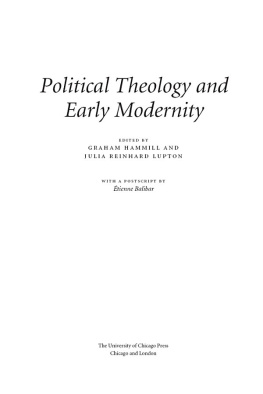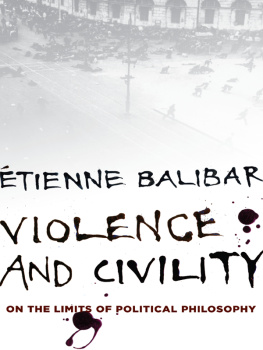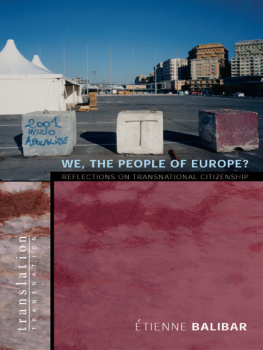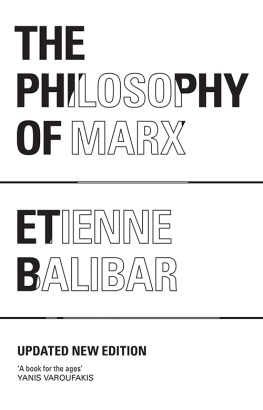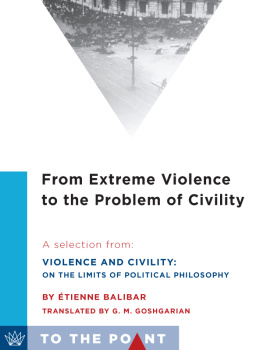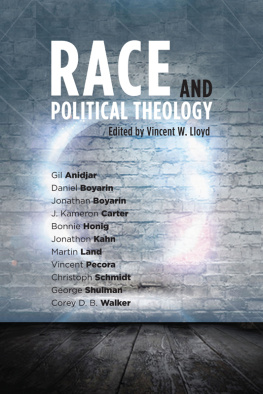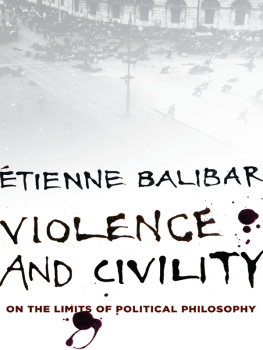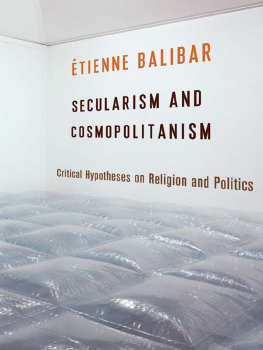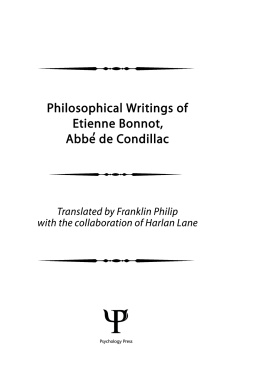Balibar Étienne - Political Theology and Early Modernity
Here you can read online Balibar Étienne - Political Theology and Early Modernity full text of the book (entire story) in english for free. Download pdf and epub, get meaning, cover and reviews about this ebook. year: 2012, publisher: University of Chicago Press, genre: Politics. Description of the work, (preface) as well as reviews are available. Best literature library LitArk.com created for fans of good reading and offers a wide selection of genres:
Romance novel
Science fiction
Adventure
Detective
Science
History
Home and family
Prose
Art
Politics
Computer
Non-fiction
Religion
Business
Children
Humor
Choose a favorite category and find really read worthwhile books. Enjoy immersion in the world of imagination, feel the emotions of the characters or learn something new for yourself, make an fascinating discovery.
- Book:Political Theology and Early Modernity
- Author:
- Publisher:University of Chicago Press
- Genre:
- Year:2012
- Rating:5 / 5
- Favourites:Add to favourites
- Your mark:
- 100
- 1
- 2
- 3
- 4
- 5
Political Theology and Early Modernity: summary, description and annotation
We offer to read an annotation, description, summary or preface (depends on what the author of the book "Political Theology and Early Modernity" wrote himself). If you haven't found the necessary information about the book — write in the comments, we will try to find it.
Political Theology and Early Modernity — read online for free the complete book (whole text) full work
Below is the text of the book, divided by pages. System saving the place of the last page read, allows you to conveniently read the book "Political Theology and Early Modernity" online for free, without having to search again every time where you left off. Put a bookmark, and you can go to the page where you finished reading at any time.
Font size:
Interval:
Bookmark:
Graham Hammill is professor of English at University at Buffalo, SUNY. He is the author of Sexuality and Form, also published by the University of Chicago Press.
Julia Reinhard Lupton is professor of English and comparative literature at the University of California, Irvine. She is the author or coauthor of four books on Shakespeare, most recently of Thinking with Shakespeare: Essays on Politics and Life, also published by the University of Chicago Press.
The University of Chicago Press, Chicago 60637
The University of Chicago Press, Ltd., London
2012 by The University of Chicago
All rights reserved. Published 2012.
Printed in the United States of America
21 20 19 18 17 16 15 14 13 12 1 2 3 4 5
ISBN-13: 978-0-226-31497-6 (cloth)
ISBN-13: 978-0-226-31498-3 (paper)
ISBN-10: 0-226-31497-9 (cloth)
ISBN-10: 0-226-31498-7 (paper)
ISBN-13: 978-0-226-31499-0 (e-book)
Portions of Adam Sitzes essay, The Tragicity of the Political: A Note on Carlo Gallis Reading of Carl Schmitts Hamlet or Hecuba, appeared as A Farewell to Schmitt: Notes on the Work of Carlo Galli in CR: The New Centennial Review 10, no. 2 (2010), published by Michigan State University Press. Part of Carlo Gallis essay, Hamlet: Representation and the Concrete, first appeared in Italian as the introduction to the Italian translation of Carl Schmitts Hamlet or Hecuba, Amleto o Ecuba (Bologna: Il Mulino, 1983). An earlier version of tienne Balibars Postscript was published as Quelle universalit des Lumires? in Le Bottin des Lumires, edited by Nadine Descendre (Paris: ENSBA, 2005), and adapted as Sjourner dans la contradiction: Lide de nouvelles Lumires et les contradictions de lUniversalisme, in Formen des Nichtwissens der Aufklrung, edited by Hans Adler-Rainer Gdel (Munich: Wilhelm Fink Verlag).
Library of Congress Cataloging-in-Publication Data
Political theology and early modernity / edited by Graham Hammill and Julia Reinhard Lupton ;with a postscript by tienne Balibar.
pages : illustrations ; cm
Includes index.
ISBN-13: 978-0-226-31497-6 (cloth : alkaline paper)
ISBN-10: 0-226-31497-9 (cloth: alkaline paper)
ISBN-13: 978-0-226-31498-3 (paperback : alkaline paper)
ISBN-10: 0-226-31498-7 (paperback : alkaline paper) 1. Political theologyHistory. 2. Political theologyHistoriography. I. Hammill, Graham L. II. Lupton, Julia Reinhard, 1963 III. Balibar, tienne, 1942
BT83.59.P64 2012
322'.1094dc23 2011050365
 This paper meets the requirements of ANSI/NISO Z39.48-1992 (Permanence of Paper).
This paper meets the requirements of ANSI/NISO Z39.48-1992 (Permanence of Paper).
Political Theology and Early Modernity
EDITED BY
GRAHAM HAMMILL AND JULIA REINHARD LUPTON
WITH A POSTSCRIPT BY
tienne Balibar
The University of Chicago Press
Chicago and London
Contents
Graham Hammill and Julia Reinhard Lupton
Victoria Kahn
Adam Sitze
Carlo Galli
TRANSLATED BY ADAM SITZE AND AMANDA MINERVINI
Graham Hammill
Jennifer Rust
Kathleen Biddick
Paul A. Kottman
Jane O. Newman
Jacques Lezra
Julia Reinhard Lupton
Drew Daniel
Gregory Kneidel
Jonathan Goldberg
tienne Balibar
TRANSLATED BY VIVIAN FOLKENFLIK
Illustrations
Acknowledgments
We would like to thank the Humanities Collective at the University of California, Irvine for co-sponsoring the symposium on political theology and early modernity that brought many of the contributors represented in this volume together for a stimulating set of exchanges. UCIs Humanities Collective also provided a generous subvention toward publication costs of this volume. The Baldy Center for Law and Social Policy at the University at Buffalo, SUNY, provided a grant so that the two of us could meet in Buffalo to draft our introduction. Nick Hoffman prepared the initial manuscript for submission, and Richard Allen has provided expert copyediting. C. J. Gordon assisted with the index. Alan Thomas has been an inspiring editor of this and kindred projects at the University of Chicago Press. Finally, we would like to thank our husbands, Richard Ridenour and Ken Reinhard, for their loving support of all that we do.
Graham Hammill and Julia Reinhard Lupton
Buffalo, New York, and Irvine, California
Introduction
GRAHAM HAMMILL JULIA REINHARD LUPTON
. The Problem
Lets get this straight. Political theology is not the same as religion. Instead, we take it to name a form of questioning that arises precisely when religion is no longer a dominant explanatory or life mode. Political theology reflects and feeds on a crisis in religion, whether that crisis is understood historically (as Reformation) at home, and the disorienting friction between sacred and secular jurisdictions, calendars, economies, membership protocols, textual operations, and styles of violence.
We take the phrase political theology to identify the exchanges, pacts, and contests that obtain between religious and political life, especially the use of sacred narratives, motifs, and liturgical forms to establish, legitimate, them of a portion of their aura. Bankrupting the Peter of the medieval church in order to pay off the Paul associated with new forms of secular authority also produced subterranean and symptomatic forms of alliance between religion and politics in a modernity founded on their putative division. (On the Peter-Paul alliance, see Julia Luptons essay on Raphaels cartoons.)
In the study of early modern Europe, political theology is often used to name a gallery of icons, rites, and narratives associated with sacred kingship and the evolving offices of the state, themselves often drawn out of the administrative care of the royal household. In this collection, however, political theology takes on a second, more polemical meaning, in which politics and theology, understood as contest rather than alliance, delineate the schism around which early modernity is constituted. Less an ideology and more of a recursive crisis, political theology unlocks the occasion in which personal sovereignty transforms into its opposites: as citizenship, the corpus mysticum, the multitude, or civil society. Political theology is thus bound up in epochal breaks and period definitions: whereas Renaissance engages primarily with the challenge of antiquity, Early Modern concerns the wars of religion and the attempt to resolve the new heterodoxies and troubling new pluralisms of the Reformation in a secular key.
Political theology, then, is neither a set of themes nor a particular form of government, but rather a scene of recurring conflictboth that which defines the early modern period as the attempt to resolve the challenges of the Reformation and that which continues to unfold today as the impossibility of the state to totalize politics. There are many political theologies, Western as well as non-Western, ancient as well as modern, that could be associated with civil religionthe use of religious belief to ensure obedience to the state or other kinds of political community. In early modern Europe, however, political theology has the status of a founding eventan event that, from the backward glance of the twenty-first century to be sure, makes early modernity modern. In post-Reformation Europe, when multiple states and sects individually claimed to embody the one true universal church, a theology that should have led to peace turns into a source of civil war and transnational conflict. Political theology isolates the knot binding religious and secularizing impulses in early modern texts in order to confront the unexpected recurrence of the same conjuncture today. For some writers in this volume, including Victoria Kahn, tienne Balibar, and Paul Kottman, this means claiming the secular with renewed intellectual vigor and vigilance, while for other writers, including Jennifer Rust and Julia Lupton, this means mining the remainders of theology for conducts of living and styles of comportment that are neither secular nor religious. Whether taken up critically or creatively, political theology confronts its readers as crisis and not content, as recurrent question rather than established doxa.
Next pageFont size:
Interval:
Bookmark:
Similar books «Political Theology and Early Modernity»
Look at similar books to Political Theology and Early Modernity. We have selected literature similar in name and meaning in the hope of providing readers with more options to find new, interesting, not yet read works.
Discussion, reviews of the book Political Theology and Early Modernity and just readers' own opinions. Leave your comments, write what you think about the work, its meaning or the main characters. Specify what exactly you liked and what you didn't like, and why you think so.

